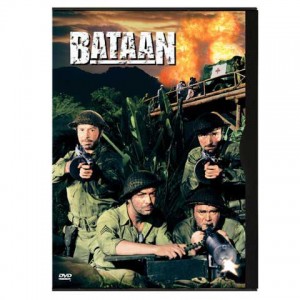14 Jun Bataan
(1943) As the Bataan Peninsula is being overrun by the Japanese, thirteen men from various Army units are ordered to destroy a bridge. It must have been around February of 1942 because they are talking about getting a message to the General. MacArthur left for Australia on March 12.
The action takes place in one small area of jungle on the far side of the bridge. Even after they blow it up, the Japanese are having no problems getting across to their side of our little unit.
We get to know most of the men pretty well. Robert Taylor plays the lead and he’s not anything like the handsome RAF officer we met in Waterloo Bridge. In one of his first movie roles, Desi Arnaz is a Hispanic soldier.
Bataan was the first movie that listed Robert Walker in the credits. He had married Jennifer Jones in 1939. but his wife had began an affair with producer David Selznick. It was Selznick’s connections that helped Walker get his contract with MGM. He plays a young sailor, boyish and emotional.
Kenneth Spencer played an African-American engineer, the demolitions expert. When I learned is that he was first an opera singer and starred in Broadway musicals and films. Spencer died on February 25, 1964, in the crash of Eastern Airlines Flight 304 from New Orleans.
According to its TCM article, “Bataan was the first feature to fully integrate soldiers of all walks of life for the cinema: Jewish, African-American, Hispanic, Filipino, and other nationalities – all of whom were treated equally and heroically. So controversial was this film at the time that Bataan actually had trouble being shown in parts of the Deep South in the 1940s. The film’s inclusion of minorities in supporting roles was due to producer Dore Schary, a staunch liberal who made a conscious effort to break the color barrier in American war films by casting one of the soldiers as black. Schary never told the screenwriters which character was to be black and also advised them against writing any pedantic speeches dealing with race (historical note: the U.S. armed forces were not integrated until after World War II). For both political reasons and pure entertainment value, Bataan is an admirable war drama worth repeated viewings.”
This was an excellent movie for one that was made so early in the war. You are up close and personal with the men who are fighting off the enemy. The end was wrenching and inevitable. I kept thinking how tough it must have been for the 1943 audiences … and they had no idea how bad it really was.



No Comments